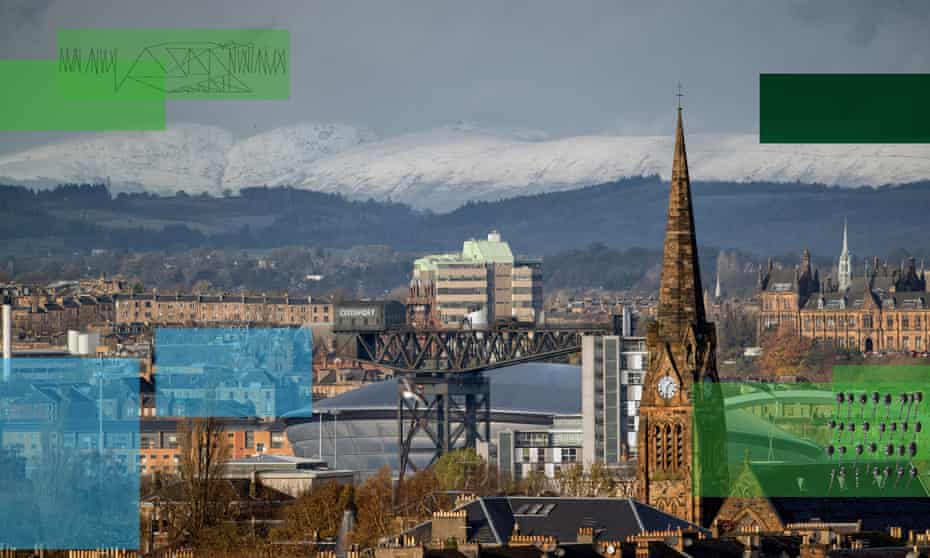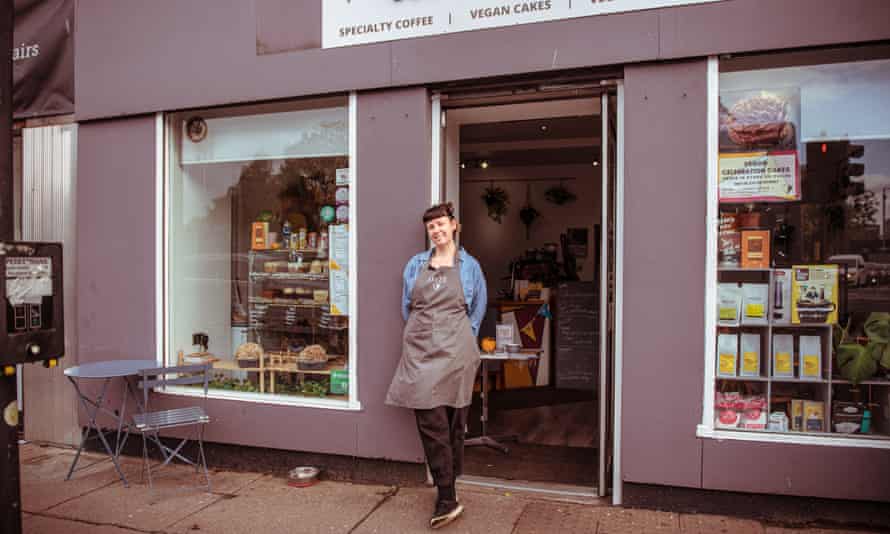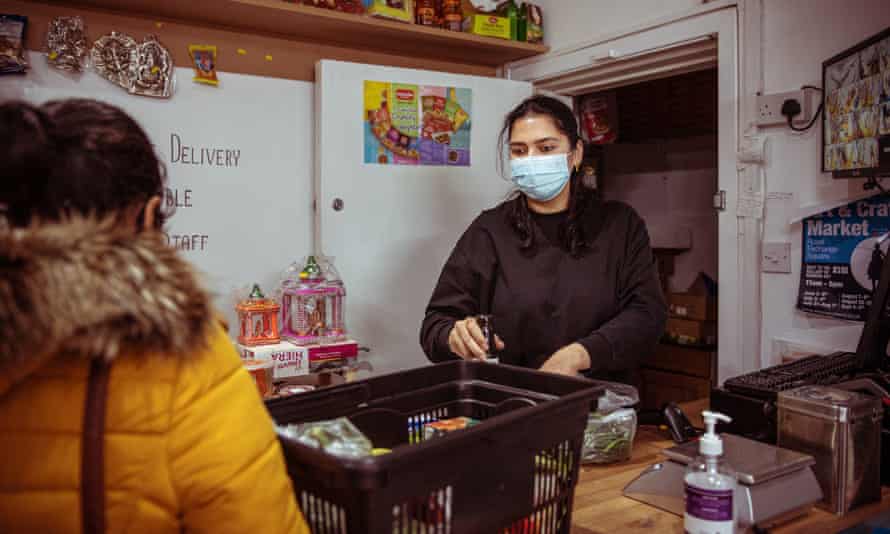‘We’ve been caught half-dressed’: ambivalent Glasgow awaits Cop26

Ambivalence, industrial disputes and other issues are complicating city’s build-up to the climate conference
Diwali candles in pretty terracotta pots are stacked around the counter at Suresh & Sons grocer in Finnieston, the Glasgow district that borders the UN-managed “blue zone” of the Scottish Event Campus. Next weekend more than 30,000 delegates from 196 countries will converge on the area for the crucial two-week Cop26 climate conference.
Four days into the event is the Hindu festival of lights, Leena Kumar explains. The council advised her to talk to suppliers about getting stock delivered before the road closures begin this weekend, but it is not that easy, she says. “We are well-informed, but we still don’t know what’s going to happen,” she laughs.
Like many Finnieston residents, Kumar is philosophical about the clash between local inconvenience and global import. “The kids are excited about the famous visitors, and they’re talking a lot about the climate at school. It’s going to be difficult, but this meeting is about the future of the world”.
Glasgow city council sent 9,000 letters to residents and businesses in the areas of the city most likely to be affected by the unprecedented influx of politicians, security, advocates and protesters. The Get Ready Glasgow website and regular e-newsletters have been running for months, though critics say information has been too web-centric, but there have been drop-ins, community council meetings and door-to-door visits too.
Q&AWhat is Cop26?Show
For almost three decades, world governments have met nearly every year to forge a global response to the climate emergency. Under the 1992 United Nations Framework Convention on Climate Change (UNFCCC), every country on Earth is treaty-bound to “avoid dangerous climate change”, and find ways to reduce greenhouse gas emissions globally in an equitable way.
Cop stands for conference of the parties under the UNFCCC. This year is the 26th iteration, postponed by a year because of the Covid-19 pandemic, and to be hosted by the UK in Glasgow.
The conference will officially open on 31 October, and more than 120 world leaders will gather in the first few days. They will then depart, leaving the complex negotiations to their representatives, mainly environment ministers or similarly senior officials. About 25,000 people are expected to attend the conference in total. The talks are scheduled to end at 6pm on Friday 12 November.
Fiona Harvey Environment correspondent
Along Argyle Street, regularly spoken of as one of the UK’s hippest neighbourhoods, locals are ambivalent. The pizza shop is worried about how its delivery drivers will pick up orders. The vegan cafe has taken on extra staff. The high-end restaurants report block bookings: “In November, every day’s a Saturday,” says one chef.
It is special for the city, says Gillian McIntyre, the owner of Mayze coffee shop, standing in front of a window-full of glossily iced cakes: “People will be talking about it for years and it has ‘Glasgow’ in the title. You hear reports that this is the last chance for humanity, and it’s happening right there,” she says, pointing down Minerva Street to the blue zone.

Further down that street, to the left a two-bedroom flat can be rented for an eye-watering GBP1,024 a night, to the right another is available at GBP1,638. Both are new listings on Airbnb, and available only for the duration of the conference, perhaps evidence of locals taking up the company’s incentive to donate all revenue from stays during the summit to the advisory group Zero Waste Scotland.
With an expected 30,000 delegates but only about 15,000 hotel rooms in Glasgow, there is a big accommodation shortfall, with some delegations reportedly forced to book hotels more than 100 miles from the venue. Two Estonia-based cruise ships docked on the Clyde have been chartered by UK government contractors to provide rooms for security personnel and production staff.
Those without bottomless resources are struggling even more. The Cop26 Homestay Network, which was launched in May, aims to match hosts from across the central belt of Scotland with visiting campaigners, scientists and non-governmental organisations. Backed by the Scottish government, about 1,000 Glaswegians have signed up, but the waiting list remains at 2,500, adding to fears that those with most direct experience of the climate crisis will be excluded from the event.
Christy Mearns, a Glasgow councillor representing inner-city wards close to the blue zone, along with Scottish Green colleagues has been liaising with La Minga Indigena, a group of about 140 tribal leaders who have attended every Cop since Rio de Janeiro in 1992, but are stuck without rooms in Glasgow.
Mearns has been pressing Glasgow council to consider more creative options: at previous summits, local government worked with activists to provide hostel-style accommodation for those who could not afford expensive hotel rooms, converting gym halls and community centres into bunkhouses. While recognising that Covid-19 restrictions add an extra layer of difficulty this year, she describes their lack of practical action as “deeply disappointing”.
The council has also faced derision for the state of the city’s streets, with reduced rubbish collections, rat infestation and a surge in fly-tipping taking a visible toll. Earlier this week, refuse workers confirmed they planned to strike during the conference, amid growing anxieties that the city’s summit arrangements are falling into chaos.
The RMT union confirmed last week that members who work for ScotRail and Caledonian Sleeper will stage industrial action for the duration of Cop26, while ScotRail engineers are also planning a series of 24-hour stoppages, both as a result of pay disputes.

Meanwhile, criminal defence lawyers are threatening to boycott Scottish government plans to deal with the potential arrests of hundreds of protesters each day, amid a row over cuts to legal aid funding, with senior legal figures warning of overflowing cells.
While the UK government, as Cop president, is responsible for organising the conference and all costs, sources have not been slow to blame the Scottish government and Scottish National party-led council for allowing so many disputes to coalesce around Cop, with warnings from opposition parties that Glasgow is about to be humiliated on the world stage.
Glasgow council has urged cleaning workers to reconsider striking during a “busy and difficult time”, while Transport Scotland says it is hoping for constructive talks between all parties before the start of the summit.
As well as the ticketed green zone across the river from the main conference site, which is open to the public and civil society groups, visitors to Glasgow can attend a plethora of events at pop-up venues across the city.
But this exchange of ideas comes at a cost: Devi Sridhar, an Edinburgh-based professor of global public health, tweeted on Thursday: “A mass event, with major movement of people in and out, with an infectious virus will cause an increase in cases. Which in the case of Covid will put stress on limited health services.”
Paul Sweeney, the Scottish Labour MSP for the Glasgow region, said: “It feels like something that is happening to the city rather than for it, and there’s no vision to use it as a springboard for recovery from the pandemic.”
He contrasts Cop26 with Glasgow’s hosting of the 2014 Commonwealth Games, “when every part of the city felt involved”. “There is an air of ambivalence, especially in the context of cuts and disputes, venues in limbo and transport issues.
“It feels like we’ve been caught half-dressed.”

